Women's World Cup: Why are there so few female coaches?
- Published
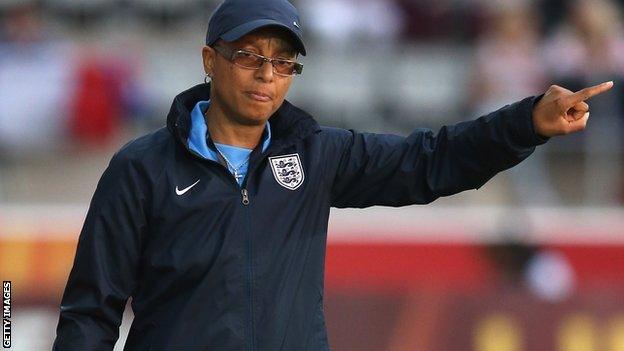
Hope Powell was in charge of the England team from 1998 to 2013
Women's World Cup semi-final: Japan v England |
|---|
Date: Thursday, 2 July. Kick-off: 00:00 BST. Coverage: Live on BBC One, BBC Radio 5 live and BBC Sport website |
Hope Powell had kept her counsel after being ousted as head coach following England's dismal performance at the 2013 European Championship but in a recent Fifa conference, the sometimes spiky Londoner, let rip.
After talking about the number of female coaches being "squeezed out" of the game, she described a global percentage of 7% as "devastating".
While the ratio of female coaches at the World Cup in Canada is not quite that bad, the woman in charge of favourites Germany says they need "more support".
Only eight of the 24 teams who have competed at the tournament had a female coach in charge but that includes the top two-ranked sides in the world - Germany and the United States - who will square up in their semi-final on Wednesday at 00:00 BST. , external
Germany's Silvia Neid is hoping to add another World Cup title to her glowing CV before she is replaced by another woman after the tournament - former international Steffi Jones. The 50-year-old has guided Germany to the 2007 title and two European Championships during her 10-year spell in charge.
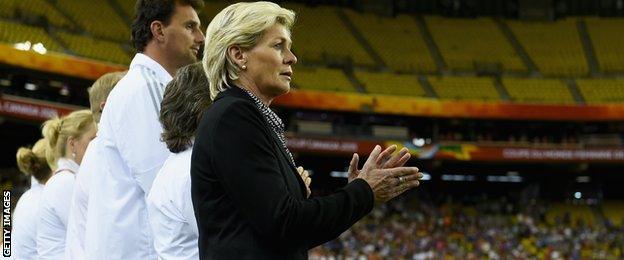
Silvia Neid says she wishes more women would coach in football
US manager Jill Ellis, who was born in England and moved to the US at 15, took over from Tom Sermanni, who was sacked in April, and hopes to continue in the path of Pia Sundhage, who guided the US to the gold medal at the London 2012 Olympics., external
The two teams may be arch rivals on the pitch but they are joined in their history of appointing women who have delivered success.
So why are there not more countries like them?
Men dominate women's coaching
"Coaching is a rough job to go into," says Norway boss Even Pellerud, 61, the eldest coach at the World Cup and a man who oversaw his country's 1995 title success.
"Traditionally females have been hesitant to go into that and set their lives aside. It's a cultural and historic thing, of course. Happily we are seeing changes coming but that will not happen overnight."
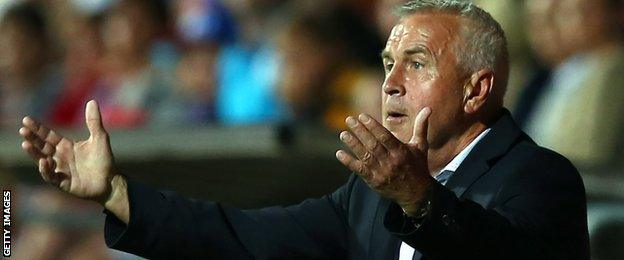
Even Pellerud is in his second spell as Norway coach
There is certainly a battle to be won. A recent report from European football governing body Uefa, external said that 80% of coaching jobs in European women's football are held by men.
Few visible women coaches means that there is a lack of role models to inspire the next generation, says Powell, who was England manager from 1998-2013 and replaced by current boss Mark Sampson.
And with 97% of European coaching licences held by men, there is also a lack of qualified staff. Only 65 women hold a Uefa Pro Licence compared to 9,387 men.
"Some women might not feel brave enough to try it," Neid told BBC Sport. "I wish more women would. It's a beautiful job."
Does sexism start from the grassroots?
Perhaps it is no wonder there are so few qualified female coaches when there is resistance from the start.
Chelsea Ladies coach Emma Hayes, the only female manager in England's top division of the Women's Super League (WSL), says that she encountered sexism while doing her Uefa B Licence aged 17.
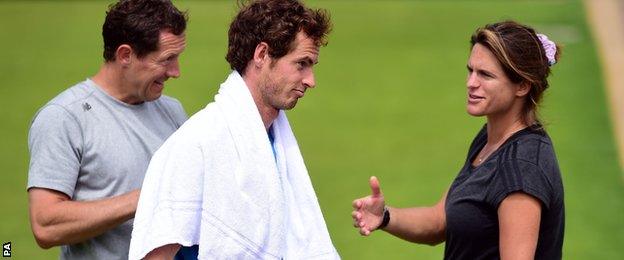
Tennis player Andy Murray said he was "amazed" by the level of criticism his appointment of Amelie Mauresmo as coach attracted
"I was asked to cup my ears on a couple of occasions," Hayes, 38, said. "I had to have quite a thick skin. I remember going home and being quite upset about it but I've got really strong parents who kicked me back out on the course and said somebody has to keep paving the way so make sure you're a part of that generation."
The experience was scarring enough, though. Hayes felt that opportunities in England would be limited so she decided to coach women's teams in the United States for the best part of the next decade.
Powell believes there is an undercurrent of sexism surrounding female leaders, as in business. She cites the critical reaction to tennis player Andy Murray appointing Amelie Mauresmo as his coach, external last year.
"People who make the appointments need to be asked: 'Do you not recognise or value women's qualifications?'" Powell said. "I have a Pro-Licence and vast experience. I could work in the Premier League but it will be a very long time before a female coach is contemplated to work at the highest level of the men's game."
Popularity increases competition
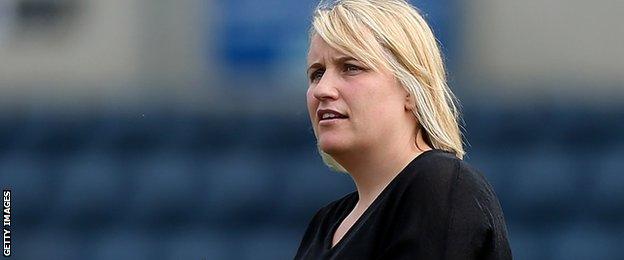
Emma Hayes has been Chelsea Ladies coach since June 2012
Fifa's slogan for the Women's World Cup is to "grow the game," and in terms of TV audiences, it has succeeded with records being broken worldwide. England's games en route to Wednesday's semi-final with Japan, external have received up to 2.6m viewers.
However, Hayes is among those who think that the growing popularity of the game will increase competition from male coaches. "It has been a job for the boys," she said.
The former Arsenal coach has talked about bringing in a change similar to the 'Rooney-rule', external to ensure that female coaches are not squeezed out. The directive was introduced to the NFL to give qualified black coaches a chance of being interviewed for available coaching positions.
Powell added: "There are opportunities to earn a living in the women's game, more so than ever before, and that is an attraction for men who are trying to get into the game.
"Women in this country can only access the game through one avenue. It just concerns me a little that there are fewer and fewer women who will be at the forefront of coaching."
Not enough role models
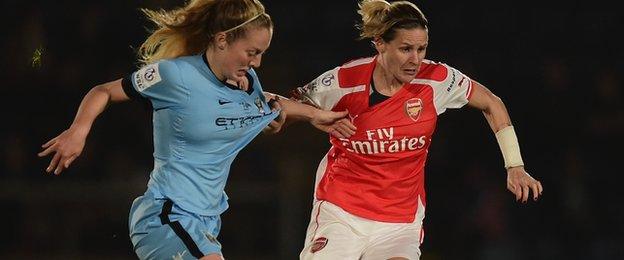
Arsenal striker Kelly Smith (right) could be a "high-calibre coach" once her playing days are over, according to Marieanne Spacey
Without women at the top of the game, the vicious circle is complete, says Powell.
"Women coaches are more likely to stay in the women's game so it's important we have role models," she said. "If there is no opportunity to coach and be involved in the game, you will find fewer taking up that challenge."
Marieanne Spacey, who was appointed as assistant coach by Sampson soon after the Welshman took the job 18 months ago, believes the current generation of senior England internationals could soon ensure Hayes is not the only female boss in WSL1.
Former England striker Spacey said: "Kelly Smith, Casey Stoney, Jo Potter and Fara Williams are four players who could be high-calibre coaches based on their playing experience, and they are also doing their coaching qualifications now.
"We'd be silly not to use these players to get more female coaches working in the WSL."
Solutions to the problem
On the international scene, there are also signs that the issue is being tackled.
Fifa have created a rule for women's Under-17s tournaments where teams must have female coaches in charge. Powell calls it "massive step forward".
"It gives an opportunity to coaches that was never there before," she added.
During her time in charge as England boss, Powell was also instrumental in setting up player and coaching pathways, a legacy that still lives on now she has left the Football Association.
Spacey also highlights coach mentoring schemes at grassroots and elite levels, while adding that the FA has been consulting other countries who are also aiming to improve on poor global figures.
"The opportunity to develop as a coach is far greater than it ever has been," she added.
"Coaching is not a quick fix at international level, you have to build a career, but I would suggest there will be an improvement in the number of females coaching countries at the next World Cup in 2019."
Additional reporting by Simon Stone and Anna Thompson
- Published29 June 2015
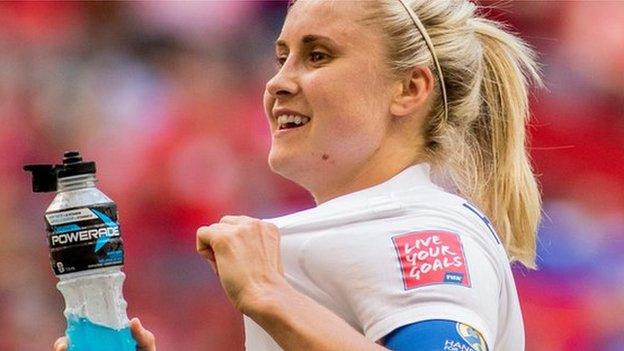
- Published7 June 2019

- Published30 June 2015

- Published29 June 2015
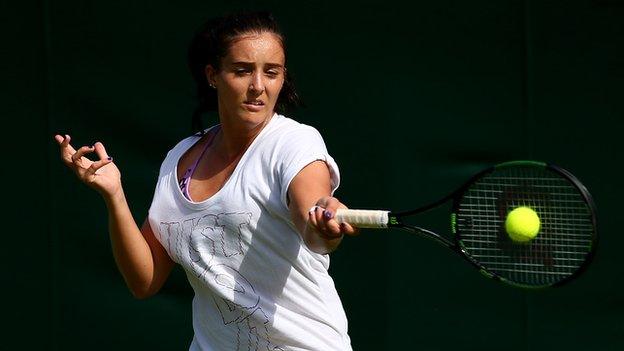
- Published20 June 2016
